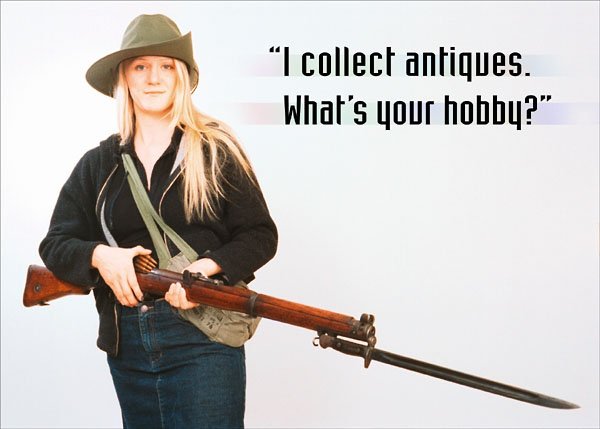|
|
|
Copyright
© A.D. 2007
by M.
D. Van
Norman.
|
|

|
Observing some of the
various on-line gun forums, I would occasionally notice the discussion
of ordering firearms under some kind of license. Initially, I assumed
this was talk among the few “kitchen table” gun dealers to survive the
purges of the W. J. Clinton administration or something equally
inapplicable to California. In fact, however, I was mistaken.
The Gun Control Act generally prohibited mail-order sales and most
other interstate firearms transactions. For obvious reasons, this does
not apply in all cases to holders of the various types of Federal
Firearms License. For example, licensed dealers order their inventories
from licensed manufacturers and licensed importers. Licensed collectors
of curios and relics may participate in the interstate trade of
firearms so classified.
Becoming a licensed collector of curio-and-relic (C&R) firearms is
a relatively painless process. The would-be collector submits copies of
the application to the Bureau of Alcohol, Tobacco, Firearms, and
Explosives (BATFE) and to the local law-enforcement agency, pays a
small fee, and undergoes a standard background check. If the applicant
is not legally disqualified, the BATFE will issue the license.
The main benefit of the collector’s license (FFL-03) is convenience. It
allows the firearms enthusiast to build a collection more efficiently
and often less expensively. Ironically, while the trade in modern
firearms is stuck in A.D.
1969, the trade in antique firearms has mostly moved into the 21st
century, with Internet sales, on-line auctions, and the like.
However, the collector’s license still has many limitations beyond the
exclusion of modern firearms. While the licensee may buy and sell
C&R guns more easily, the license is not a permit to do business as
a firearms dealer. The licensee
must also maintain transaction records, which may be inspected by the
BATFE. Finally, of course, the licensee is still subject to state and
local laws.
This last point can lead to a lot of confusion, and it certainly did
for me at first. California law recognizes federal C&R definitions
and also provides similar if more limited exemptions for the transfer
of older firearms between non-licensees, which leads many to assume
incorrectly that these are the only exemptions that apply to
Californian
FFL-03 holders. In fact, that which is not prohibited is permitted.
|
|



